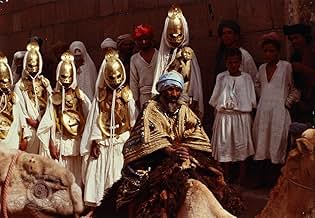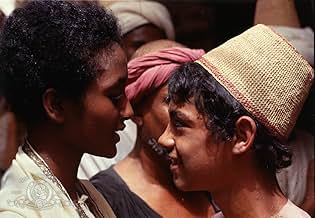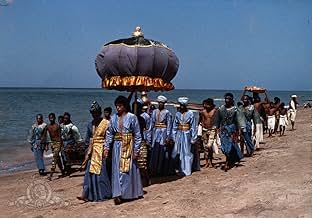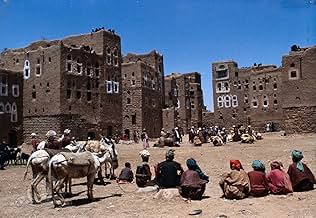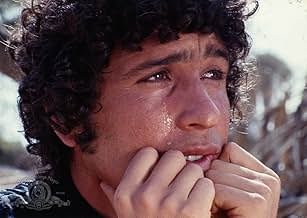AVALIAÇÃO DA IMDb
6,6/10
9,6 mil
SUA AVALIAÇÃO
Um jovem é escolhido por uma bela escrava para ser seu novo mestre; ela é sequestrada e eles devem procurar um ao outro. As histórias são contadas dentro de histórias; amor, viagens e os cap... Ler tudoUm jovem é escolhido por uma bela escrava para ser seu novo mestre; ela é sequestrada e eles devem procurar um ao outro. As histórias são contadas dentro de histórias; amor, viagens e os caprichos do destino.Um jovem é escolhido por uma bela escrava para ser seu novo mestre; ela é sequestrada e eles devem procurar um ao outro. As histórias são contadas dentro de histórias; amor, viagens e os caprichos do destino.
- Direção
- Roteirista
- Artistas
- Prêmios
- 1 vitória e 3 indicações no total
Tessa Bouché
- Aziza
- (as Tessa Bouche')
Margareth Clémenti
- Madre di Aziz
- (as Margaret Clementi)
Elisabetta Genovese
- Munis
- (as Elisabetta Vito Genovese)
Avaliações em destaque
Surely there's a lot to admire and enjoy in this movie: the settings and costumes are extremely colourful, the locations exotic, at times almost dreamlike, and at several times there are stunning mass-scenes. All this makes watching it a dazzling and overwhelming experience. But - at least with me - this movie also evokes bewilderment, confusion and irritation.
Using local amateurs can give a feeling of authenticity, but here is such an abundance of amateurism that it gets on your nerves. Many of the cast don't seem to act at all, but just obediently follow orders: they either loiter about or run around frantically, they grin sheepishly or feign to cry, they rattle their obviously later dubbed Italian lines in mostly loud and high-pitched voices, and then sooner or later (mostly sooner) they take their clothes off, that's about it. The musical score is very strange and uneven, at some parts beautiful music (Morricone!), at other times there are long streches of bland silence. Strangely enough never Arabian-sounding music, which couldn't have been hard to find around the locations where they filmed.
I don't mind a bit of nudity and sex, but this is really way over the top: every guy that pops around the corner is stark naked within a minute or two and runs around like that for the rest of the film. And mind you, this is a 1974 movie that actually won a renowned prize (in Cannes)! What on earth is the point of all this exhibitionism, there are numerous instances where there appears to be no functional motivation for it whatsoever.
Maybe Pasolini liked to create confusion and bewilderment. It's only a bit hard to admire this film for just that and for the enchanting cinematography.
Using local amateurs can give a feeling of authenticity, but here is such an abundance of amateurism that it gets on your nerves. Many of the cast don't seem to act at all, but just obediently follow orders: they either loiter about or run around frantically, they grin sheepishly or feign to cry, they rattle their obviously later dubbed Italian lines in mostly loud and high-pitched voices, and then sooner or later (mostly sooner) they take their clothes off, that's about it. The musical score is very strange and uneven, at some parts beautiful music (Morricone!), at other times there are long streches of bland silence. Strangely enough never Arabian-sounding music, which couldn't have been hard to find around the locations where they filmed.
I don't mind a bit of nudity and sex, but this is really way over the top: every guy that pops around the corner is stark naked within a minute or two and runs around like that for the rest of the film. And mind you, this is a 1974 movie that actually won a renowned prize (in Cannes)! What on earth is the point of all this exhibitionism, there are numerous instances where there appears to be no functional motivation for it whatsoever.
Maybe Pasolini liked to create confusion and bewilderment. It's only a bit hard to admire this film for just that and for the enchanting cinematography.
"Fiore delle mille e una notte" ,which won special prize at CANNES 1974 is the third part of what Pasolini called the trilogy of life which encompasses "il decameron" (1971) and" racconti di Canterbury" (1972). It's the most accessible of all Pasolini movies ,and weren't it for the numerous nudities,it would appeal to large audience.
This must be the script:it's much better than the two first films because the story is built à la Shéhérazade ,with plots ,subplots and subsubplots which fit into each other;and although sex is the main vector,it features enough twists to sustain the interest throughout.It does not forget magic (the segment which features Ninetto Davoli,Pasolini's favorite actor,uses a lot of symbols)and mystery (the adolescent who must be killed when he's fifteen ).Humor is less vulgar than in "di racconti di Canterbury" The little riddle "the aromatic grass of the fields" "the slit pomegranate" and "the inn of the warm welcome " is witty.
Little did we know that Pasolini would follow his trilogy of life with the most depressing work ever made :"Salo" (1975).
This must be the script:it's much better than the two first films because the story is built à la Shéhérazade ,with plots ,subplots and subsubplots which fit into each other;and although sex is the main vector,it features enough twists to sustain the interest throughout.It does not forget magic (the segment which features Ninetto Davoli,Pasolini's favorite actor,uses a lot of symbols)and mystery (the adolescent who must be killed when he's fifteen ).Humor is less vulgar than in "di racconti di Canterbury" The little riddle "the aromatic grass of the fields" "the slit pomegranate" and "the inn of the warm welcome " is witty.
Little did we know that Pasolini would follow his trilogy of life with the most depressing work ever made :"Salo" (1975).
'Il Fiore delle mille e una notte', or 'Arabian Nights', is Pier Paolo Pasolini's final film from his "trilogy of life" and his second to last film in general. His last of course is 'Salo, or 120 Days of Sodom', the controversial first film from his "trilogy of death".
With 'Arabian Nights' Pasolini combines a couple of stories from the book 'A Thousand and One Nights' into one story, although the film itself still feels very episodic. All parts of the story deal with love, or actually I should say lust, ending in sex. Especially the penis gets enough screen time here, it might as well be the leading character. The sex scenes themselves are, in my opinion, not very sensual or erotic (although they admittedly are when you compare them to such scenes in any other Pasolini film) which is not necessarily a bad thing, but it becomes exactly that when more than half the movie exists out of them.
On the other hand the film is pretty entertaining, mostly for its oddness. That again, is something we see in almost any other Pasolini film. His distant approach adds to that feeling, especially when he shows violent images. One might not expect them in a film that arguably celebrates love and sex. Another factor for the oddness is the terrible acting, especially from the men. Maybe good acting is impossible for them here since Pasolini presents them as a bunch of whiners who would do anything for love. Of course, once again, with love I mean sex. The Italian language in the Eastern setting is another thing that feels pretty weird as well. All these elements add to the oddness which makes the film more entertaining than it probably should have been.
I have to conclude with saying that I sort of admire Pasolini. I think only his 'Il vangelo secundo Matteo' can be considered as a truly great film, mostly since his approach is the distant one. I think that is a good thing when it comes to a religious film like that. that approach in his other films is not always the right one, but it is one aspect of why his films are different, often daring. Even when not much is happening, or when we have no clue what is happening, or when we normally would not care that much, Pasolini keeps it kind of interesting.
With 'Arabian Nights' Pasolini combines a couple of stories from the book 'A Thousand and One Nights' into one story, although the film itself still feels very episodic. All parts of the story deal with love, or actually I should say lust, ending in sex. Especially the penis gets enough screen time here, it might as well be the leading character. The sex scenes themselves are, in my opinion, not very sensual or erotic (although they admittedly are when you compare them to such scenes in any other Pasolini film) which is not necessarily a bad thing, but it becomes exactly that when more than half the movie exists out of them.
On the other hand the film is pretty entertaining, mostly for its oddness. That again, is something we see in almost any other Pasolini film. His distant approach adds to that feeling, especially when he shows violent images. One might not expect them in a film that arguably celebrates love and sex. Another factor for the oddness is the terrible acting, especially from the men. Maybe good acting is impossible for them here since Pasolini presents them as a bunch of whiners who would do anything for love. Of course, once again, with love I mean sex. The Italian language in the Eastern setting is another thing that feels pretty weird as well. All these elements add to the oddness which makes the film more entertaining than it probably should have been.
I have to conclude with saying that I sort of admire Pasolini. I think only his 'Il vangelo secundo Matteo' can be considered as a truly great film, mostly since his approach is the distant one. I think that is a good thing when it comes to a religious film like that. that approach in his other films is not always the right one, but it is one aspect of why his films are different, often daring. Even when not much is happening, or when we have no clue what is happening, or when we normally would not care that much, Pasolini keeps it kind of interesting.
This film version keeps much of the eroticism in Sir Richard Burton's original translation, which previous movie treatments saw fit to water down
Great care was taken in the details: it was shot on location (Africa and the Middle East) and a dark skinned girl was cast as the princess
The acting is extremely good, and the stories connect in and out in intriguing fashion...
The film selects some of the more popular of the Arabian Nights stories, but intertwines them in strange ways Like the original, many stories lead into other stories and again into others
One of the most erotic sequences is when two supernatural beings decide to play a trick on a virginal girl and boy The beings make each young person seduce the other while he or she is asleep In another scene, one of the heroes finds himself in a pool with a group of very pretty, very nude Arabian women, who tease and tickle him into an intense joy
The film selects some of the more popular of the Arabian Nights stories, but intertwines them in strange ways Like the original, many stories lead into other stories and again into others
One of the most erotic sequences is when two supernatural beings decide to play a trick on a virginal girl and boy The beings make each young person seduce the other while he or she is asleep In another scene, one of the heroes finds himself in a pool with a group of very pretty, very nude Arabian women, who tease and tickle him into an intense joy
There's a lot of potential moral quandaries associated with this movie: real animals getting killed, disturbingly young actors engaging in simulated sex acts, some unsettling adult themes and the general feeling of heat and stench conveyed by the flies and sweat. Then there's Pasolini's signature shaky camera-work and rough acting from non-actors.
If you can get past the thirty minute mark, and a few boring sequences, you may find yourself like I was charmed enough by its incidents that you keep watching to the end, waiting to see what surprise lay in store next.
It features some wonderful moments that suit the mythical source material, and as plentiful supply of penises there ever was, certainly if you count unique penises, I reckon this could beat most pornos, if that's your cup of tea. They're normally just sitting there, bear in mind, but often they're doing other things.
Not exactly family fare, but for those seeking a bit of weirdness, this may just hit the right spot. It would probably be hilarious if dubbed over Kung Pow style. (Or What's Up Tigerlilly style if you prefer).
5/10 for me.
If you can get past the thirty minute mark, and a few boring sequences, you may find yourself like I was charmed enough by its incidents that you keep watching to the end, waiting to see what surprise lay in store next.
It features some wonderful moments that suit the mythical source material, and as plentiful supply of penises there ever was, certainly if you count unique penises, I reckon this could beat most pornos, if that's your cup of tea. They're normally just sitting there, bear in mind, but often they're doing other things.
Not exactly family fare, but for those seeking a bit of weirdness, this may just hit the right spot. It would probably be hilarious if dubbed over Kung Pow style. (Or What's Up Tigerlilly style if you prefer).
5/10 for me.
Você sabia?
- CuriosidadesThis film is the final entry in director Pier Paolo Pasolini's "Trilogy of Life," following O Decameron (1971) and Os Contos de Canterbury (1972).
- Erros de gravaçãoWhen the chimpanzee is writing, it's clearly visible that it's not actually the chimp writing but an actor wearing a glove made to look like the chimp's hand.
- Cenas durante ou pós-créditos"Truth lies not in one dream, but in many." - Arabian Nights
- Versões alternativasThe 1990 Water Bearer Films video release (WBF 8001) is marked "Original Uncut Version" with a runtime of 133 min. It is rated X.
- ConexõesEdited into Porno & libertà (2016)
Principais escolhas
Faça login para avaliar e ver a lista de recomendações personalizadas
- How long is Arabian Nights?Fornecido pela Alexa
Detalhes
- Data de lançamento
- Países de origem
- Idiomas
- Também conhecido como
- Las mil y una noches
- Locações de filme
- Mesjed-e-Imam, Esfahan, Irã(Zumurrud's palace)
- Empresas de produção
- Consulte mais créditos da empresa na IMDbPro
Bilheteria
- Faturamento bruto mundial
- US$ 755
- Tempo de duração
- 2 h 10 min(130 min)
- Mixagem de som
- Proporção
- 1.85 : 1
Contribua para esta página
Sugerir uma alteração ou adicionar conteúdo ausente



